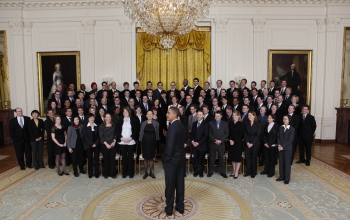News Release 10-008
Obama Bestows Highest Presidential Honor on Early Career Scientists and Engineers
Twenty PECASE awardees were nominated by NSF from its distinguished pool of CAREER awardees

President Barack Obama talks to PECASE recipients.
January 14, 2010
This material is available primarily for archival purposes. Telephone numbers or other contact information may be out of date; please see current contact information at media contacts.
At the White House yesterday, President Barack Obama bestowed on 100 men and women the United States government's highest honor for scientists and engineers in the early stages of their independent research careers--the Presidential Early Career Award for Scientists and Engineers (PECASE). Among the awardees, twenty were nominated by the National Science Foundation. These awardees come from universities around the country, and excel in research in a variety of scientific disciplines: biological sciences, computer and information science and engineering, education and human resources, engineering, geosciences, mathematical and physical sciences, and social, behavioral and economic sciences.
All NSF PECASE awardees are drawn from a pool of individuals who have already been selected through rigorous peer review to receive five-year grants through the Faculty Early Career Development (CAREER) Program. CAREER awardees are those who have proven themselves exemplary in integrating research and education within the context of the mission of their organization. The competition is rigorous: in 2008, NSF made 455 CAREER awards, from more than 2500 proposals reviewed.
The Presidential Early Career Awards embody the high priority the Administration places on producing outstanding scientists and engineers to advance the nation's goals and contribute to all sectors of the economy.
The President's meeting with the PECASE winners highlighted the administration's recognition that America's global leadership in science and technology is not automatic, but depends on constantly cultivating new generations of ambitious and dedicated explorers in the sciences and engineering. There was also an acknowledgement that national nourishing of curiosity starts even earlier than that, in the way we teach children about science, technology, engineering and mathematics. That's why this event resonates strongly with those of last week, when the President announced an expansion of the "Educate to Innovate" campaign to encourage and inspire young students to pursue studies in science, technology, engineering and math (STEM).
The awards, established by President Clinton in February 1996, are coordinated by the Office of Science and Technology Policy within the Executive Office of the President. Awardees are selected on the basis of two criteria: pursuit of innovative research at the frontiers of science and technology and a commitment to community service as demonstrated through scientific leadership, public education, or community outreach.
This year's recipients were first announced over the summer, and received their awards and met with the President Wednesday. Their names and Federal Departments and Agencies can be seen in the official White House press release issued in July.
This year's NSF recipients are: Maria M. Calbi, Southern Illinois University Carbondale
Amy B. Cerato, University of Oklahoma
Ioannis Chasiotis, University of Illinois at Urbana-Champaign
Monica F. Cox, Purdue University
Cameron R. Currie, University of Wisconsin-Madison
Joel L. Dawson, Massachusetts Institute of Technology
Jimmy de la Torre, Rutgers, The State University of New Jersey
Roland G. Fryer Jr., Harvard University
Sean Hallgren, The Pennsylvania State University
John M. Herbert, The Ohio State University
Steven D. Jacobsen, Northwestern University
Charles R. Keeton II, Rutgers, The State University of New Jersey
Chun Ning Lau, University of California, Riverside
Hao Lin, Rutgers, The State University of New Jersey
Harmit S. Malik, Fred Hutchinson Cancer Research Center
Rada F. Mihalcea, University of North Texas
Scott R. Sheffield, Massachusetts Institute of Technology
Zuzanna S. Siwy, University of California, Irvine
Adam D. Smith, The Pennsylvania State University
Joy K. Ward, University of Kansas
Note to regional reporters: For more information about, or interviews with, local winners of the Presidential Early Career Award for Scientists and Engineers, please contact the awardees' home institution or agency.
###
-NSF-
-
NSF PECASE awardees joined family, friends and NSF officials to celebrate receiving this honor.
Credit and Larger Version -
NSF-nominated PECASE awardees were honored at NSF before receiving their honor at the White House.
Credit and Larger Version
Media Contacts
Lisa-Joy Zgorski, NSF, (703) 292-8311, email: lisajoy@nsf.gov
Program Contacts
Mayra N. Montrose, NSF, (703) 292-4757, email: mmontros@nsf.gov
Related Websites
President Obama Honors Outstanding Early-Career Scientists: http://www.whitehouse.gov/the_press_office/PRESIDENT-HONORS-OUTSTANDING-EARLY-CAREER-SCIENTISTS/
President Obama Names PECASE Awardees: http://www.nsf.gov/news/news_summ.jsp?cntn_id=115171
NSF PECASE Factsheet: http://www.nsf.gov/news/newsmedia/pr115171/pr115171.pdf
NSF PECASE solicitation: http://www.nsf.gov/funding/pgm_summ.jsp?pims_id=503214
Office of Science and Technology Policy: http://www.ostp.gov
The U.S. National Science Foundation propels the nation forward by advancing fundamental research in all fields of science and engineering. NSF supports research and people by providing facilities, instruments and funding to support their ingenuity and sustain the U.S. as a global leader in research and innovation. With a fiscal year 2023 budget of $9.5 billion, NSF funds reach all 50 states through grants to nearly 2,000 colleges, universities and institutions. Each year, NSF receives more than 40,000 competitive proposals and makes about 11,000 new awards. Those awards include support for cooperative research with industry, Arctic and Antarctic research and operations, and U.S. participation in international scientific efforts.
Connect with us online
NSF website: nsf.gov
NSF News: nsf.gov/news
For News Media: nsf.gov/news/newsroom
Statistics: nsf.gov/statistics/
Awards database: nsf.gov/awardsearch/
Follow us on social
Twitter: twitter.com/NSF
Facebook: facebook.com/US.NSF
Instagram: instagram.com/nsfgov


